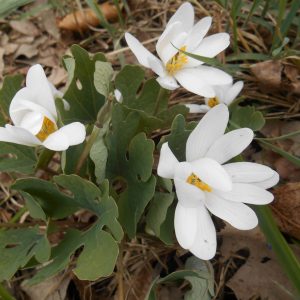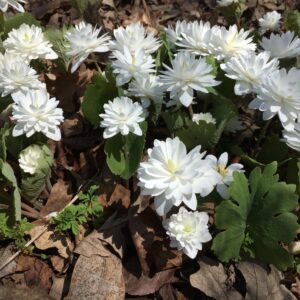…Adluma fungosa Blood Carnation Dianthus cruentus Bloodroot Sanguinaria canadensis Bloody cranesbill Geranium sanguineum v. Lancatrense, v. Striatum Blueberry, Lowbush Vaccinium angustifolium Blue bugle Ajuga genevensis Blue cardinal flower Lobelia siphilitica…
More »Search Results for: bloodroot
-
Sanguinaria canadensis Bloodroot, Indian paint, Red Puccoon Z 3-9
...swan-white anemone-like blooms in spring from the center of glaucus, grey-green, lobed, puckered, rolled leaves. Both the leaves and root contain a red liquid. (Bloodroot) Ephemeral, dies back in summer....
Available for purchase in Spring only
Very showy, swan-white anemone-like blooms in spring from the center of glaucus, grey-green, lobed, puckered, rolled leaves. Both the leaves and root contain a red liquid. (Bloodroot) Ephemeral, dies back in summer.
Size: 6” x 12”
Care: part shade to shade in moist well-drained soil
Native: Nova Scotia to Manitoba, south to Florida and Arkansas, Wisconsin native
Wildlife Value: deer resistant. Pollen, but no nectar, makes this attractive to many different bees. Ants distribute the seeds.Sanguinaria is Latin meaning “blood,” so named for the red color of the sap. For Natives red sap used to make dye for skin, clothing, weapons and baskets. Used to induce abortions, as well as an aphrodisiac and cure sexually transmitted diseases. The root rubbed on the palm of the hand was a love charm for Ponca men. Iroquois prescribed it for diarrhea and constipation, to draw out slivers, hiccups, and generally as a panacea. It was administered to those who saw a corpse. Sioux used a weak solution to cure fever, rheumatism, congestion, and skin cancer, Ojibwa made dried roots into a necklace to prevent bleeding. 1st collected by Rev. John Banister in colonial Virginia c. 1678. According to John Bartram this was “…(C)alled by the Country People, Red Root, or Tumerick The Root dried and powdered is recommenced by Dr. Colden, as a Cure for jaundice, the Powder has been given to the Weight of a Drachm in Small Beer; and by others, for the Bite of a Rattle Snake.” Grown at Shadwell, Jefferson’s birthplace and home until it burned in 1770. Grown at America’s 1st botanic garden, Elgin Botanic Garden 1811, located where Rockefeller Center now stands. Pressed specimen in Emily Dickinson’s herbarium.
-
Sanguinaria canadensis f. multiplex Double-flowered bloodroot Z 4-8
OUT OF STOCK Ephemeral- Available for purchase in spring only Snowballs of pure white open to dozens of petals atop unfolding, glaucous, grey-green mitten-shaped foliage in early spring. By late...
OUT OF STOCK
Ephemeral- Available for purchase in spring only
Snowballs of pure white open to dozens of petals atop unfolding, glaucous, grey-green mitten-shaped foliage in early spring. By late spring it recedes into the earth and goes dormant. Inside its roots are same red sap as in the single form. It is sterile and can only be propagated by division.
LIMITED QUANTITIES AVAILABLE, LIMIT OF 1 PER CUSTOMER PLEASE
Size: 6” x 12”
Care: part-shade to shade in moist well drained soil. Mark its location so you don’t forget in September and dig into it.
Native: mutation of native American single-form
Wildlife Value: deer resistant
Awards: Royal Horticultural Society named this one of the top plants of the last 200 years Award of Garden Merit; Great Plant Pick 2004Discovered by Guido von Webern growing in a clump of single Bloodroots in the 7 acre plot he recently purchased at the corner of North Main St and Turner Rd in Dayton OH in 1917.
Round Two – Happy Birthday Mr. President
…over the garden gate Primula veris Cowslip Primula vulgalis Common primrose Pulsatilla vulgaris syn.Anemone Pasque flower Ranunculus repens var. pleniflorus Creeping buttercup Sanguinaria canadensis Bloodroot Viola tricolor Johnny jump up…
More »


